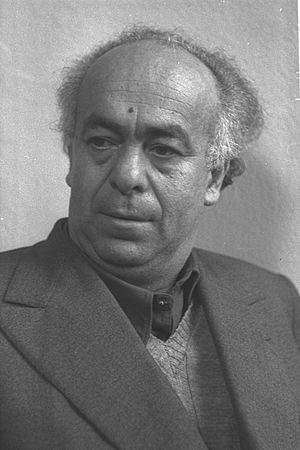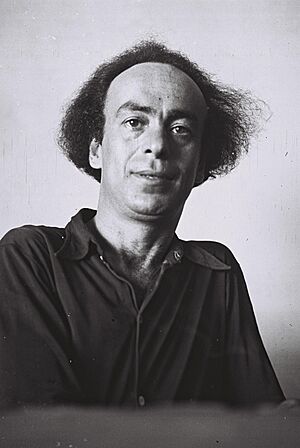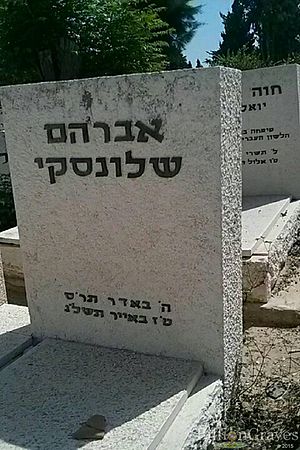Avraham Shlonsky facts for kids
Quick facts for kids
Avraham Shlonsky
|
|
|---|---|

Avraham Shlonsky in 1952
|
|
| Born | March 6, 1900 Kryukovo (Poltava Oblast), Russian Empire (today in Ukraine) |
| Died | May 18, 1973 (aged 73) Tel Aviv |
| Occupation | poet, writer, playwright, translator, educator |
| Nationality | Israeli (since 1948) |
| Literary movement | Established the Yakhdav group (Hebrew symbolism) |
| Spouse | Lucia Laykin, Mira Horvitz |
Avraham Shlonsky (born March 6, 1900 – died May 18, 1973) was an important Israeli poet and editor. He was born in the Russian Empire, which is now part of Ukraine.
Shlonsky greatly influenced modern Hebrew and its literature in Israel. He did this through his many famous translations of classic books. He also wrote original Hebrew children's stories. People knew him for his humor. His friends even called him "Lashonsky" because lashon means "tongue" or "language." This nickname showed how clever he was with new Hebrew words.
Contents
Avraham Shlonsky's Life Story
Avraham Shlonsky was born into a Hasidic family in Kryukovo, Ukraine. His father, Tuvia, followed the Chabad Hasidic group. His mother, Tzippora, was a Russian revolutionary.
In 1913, when Avraham was 13, he moved to Ottoman Palestine. He went to study at the famous Herzliya Hebrew High School in Tel Aviv. When World War I began, he returned to Ukraine.
In 1921, his whole family moved to Mandatory Palestine. Avraham worked hard, paving roads and helping with construction. He joined a group called Gdud Ha'avoda. He also helped to start Kibbutz Ein Harod in the Jezreel Valley. Avraham Shlonsky passed away in Tel Aviv in 1973.
Shlonsky's Writing Career
Shlonsky published his first poem in 1919 in the newspaper Ha-Shiloah. He wrote songs for funny stage shows. He also created songs for the Purim holiday costume parties in early Tel Aviv. Even early on, he showed a talent for witty writing. He often created new words in the developing Hebrew language.
Over time, he became a leader of a "rebel" group of poets. They wanted to create new, lively poetry. They felt that the older generation's poems were too old-fashioned. Because of this, for many years, Shlonsky's poems were not taught in schools.
In 1933, Shlonsky started a weekly literary magazine called Turim. This magazine was connected to the "Yachdav" group. Famous poets like Natan Alterman and Leah Goldberg were part of this group. As an editor, Shlonsky helped new poets publish their work. For example, Dahlia Ravikovitch published her first poem in a magazine Shlonsky edited.
Shlonsky was also known for helping Boris Gaponov. Gaponov translated a Georgian epic poem into Hebrew. Shlonsky helped publish this translation in Israel. He also worked to help Gaponov move to Israel. When Gaponov arrived, he was very ill. People remember seeing Shlonsky caring for him like a father.
Even though he was known for humor, Shlonsky also wrote about sad events. In his poem "Distress," he wrote about the victims of World War I. He also wrote about Jewish people who suffered during difficult times in Ukraine.
During the Holocaust, he published a collection of poems called ממחשכים (From Concealing Shadows). In these poems, he shared his feelings about that very dark time. He especially wrote about the fate of Jewish people in Europe.
Awards and Honors
- In 1946, Shlonsky won the Tchernichovsky Prize. This award was for his excellent translations of Eugene Onegin by Alexander Pushkin and Hamlet by Shakespeare.
- In 1959, he received the Bialik Prize for literature. He shared this award with Eliezer Steinman.
- In 1967, he was given the Israel Prize, which is one of Israel's highest honors, for his literature.
Famous Works
His poetry collection Rough Stones shows his work as a mature poet. Poems from the Long Corridor shares his thoughts on life and death.
Shlonsky is also considered one of the best Hebrew children's poets. He wrote books like Mickey Who? and Me and Tali in Lhama Country.
The play Utzli-Gutzli became a classic Hebrew children's play. It is about the dwarf Rumpelstiltskin from a German legend. In Shlonsky's translation for the stage, all the words are in rhyme. He used clever wordplay with advanced Hebrew. Here is an example from Utzli-Gutzli:
| yed`ú kol ir, kol kfar vapélekh: | יֵדְעוּ כָּל עִיר, כָּל כְּפָר וָפֶלֶךְ: |
| reishít chokhmá – misím lamélekh! | רֵאשִׁית חָכְמָה – מִסִּים לַמֶּלֶךְ! |
| misím, misím, ve`ód misím – | מִסִּים, מִסִּים וְעוֹד מִסִּים – |
| ve-éyn chasím al hakisím! | וְאֵין חָסִים עַל הַכִּיסִים! |
- Every city, province, town, learn the first rule: pay the crown!
- Tax and tariff, fee and fare, not a pocket shall you spare!
Shlonsky's translations of books from other languages are very special. You can recognize his unique style from the very first lines. Many writers and readers of Hebrew literature still admire his translations. He translated many famous classics, including works by William Shakespeare, Anton Chekhov, Nikolai Gogol, and Romain Rolland.
He translated Hamlet by Shakespeare, even though many other Hebrew translators had tried before. Shlonsky's special language shines through. He translated Shakespeare from Russian, not directly from English. But this did not make his translation any less amazing.
Individual Poems
- "Toil" (1928)
See Also
 In Spanish: Avraham Shlonsky para niños
In Spanish: Avraham Shlonsky para niños
- List of Israel Prize recipients
- List of Bialik Prize recipients
 | Jackie Robinson |
 | Jack Johnson |
 | Althea Gibson |
 | Arthur Ashe |
 | Muhammad Ali |



